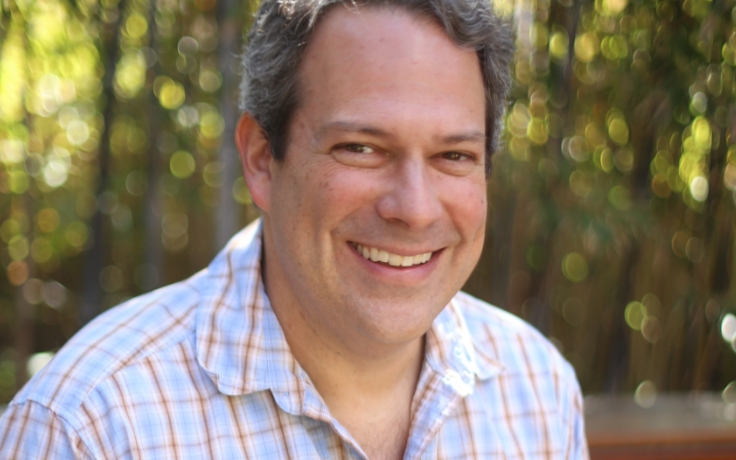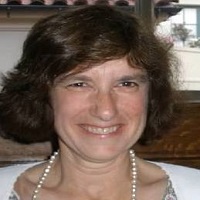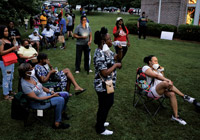THE TREE BRANCHES HANGING OVER JASON BERLIN’S GARDEN, all in a tangle, are an appropriate metaphor for someone who upended his life five years ago.
A former writer of comedy and reality television, Berlin is now executive director of Field Team Six, which he founded. His mission: to register Democrats and prod them to cast ballots in the face of Republican efforts to enact voting laws that would make fair, diverse and (small d) democratic governance impossible. Republicans favor such laws in California, where they are unlikely to win approval, but they passed last year in Georgia, Arizona and Texas. A double handful of other states, where the odds of success are greater, are considering their own versions.
But not if Berlin can help it. Berlin is a genial guy who is deadly serious about improving governance, both here and elsewhere, by overwhelming Republican efforts to make voting more difficult, especially in battleground states. He wants to help turn out 1 million new voters come November.
If you think political activism means angry people in Birkenstocks, says New Faces of Democracy, a website of videos and podcasts, “Let Jason and his infectious good humor prove you wrong.” His slogan is: “Register Democrats, Save the World.” This, Berlin said, “is the most meaningful work I’ve ever done.”
But will it be enough to overcome gerrymandered congressional districts, shortened voting hours, and laws that could allow state and local election officials to overturn the popular vote?
Comedian to activist
THE TREES ENTWINING INTO A CANOPY over much of Berlin’s property in Mount Washington, in northeast Los Angeles, bear impressive crops of lemons. But Berlin doesn’t make lemonade. Instead, the fruit went to hungry families last year, courtesy of a local food bank. And don’t call the squirrel, who darts among the branches, a pest. She is Daisy, a friend of his, comfortable enough to approach his open palm for a treat.
Voter registration is political scut work, long the province of retired women and wild-haired college students bent on changing the world. Berlin is neither. A former stand-up comedian who had no significant political background, he became so distraught at Donald Trump’s election that he quit Hollywood, worked briefly for the California Democratic Party, then created Field Team Six, a nonprofit devoted solely to registering new Democrats.
He is a 50-year-old teddy bear of a man who struggles with social anxiety, but he has built the organization into a Democratic powerhouse driving voter registration nationally. It has partnered with Democratic grassroots groups across the country with a particular focus on nine swing states.
Field Team Six has created new online tools enabling eligible voters to register through their cellphones and new digital ways to track whether contacts follow through and register. It says it helped register more than 1.7 million new Democrats during the 18 months before the November 2020 election.
Still, political scientists like UCLA’s Matt Barreto are worried.
State laws intended to suppress voters or allow local officials to invalidate results “are already absolutely working,” he said. For example, Texas officials rejected thousands of applications to vote by mail in their March 1 primary under legislation passed last year. New laws and bills pending in dozens of other states could allow local election officials to do the same.
Moreover, young voters, a focus of Berlin’s efforts, can be fickle. While 2020 saw a record turnout among 18- to 25-year olds, they will always vote at lower rates than people over 40, Barreto said. They don’t yet have enough life experience to see how their votes can, for example, address climate change or improve their household budgets.
A cadre of volunteers
BERLIN REGARDS HIS 18 YEARS IN ENTERTAINMENT as excellent training for leading a shoestring political organization. “There is no industry more abusive [than entertainment], with such a high poverty and high insecurity threshold,” he said, as birds chirped above and traffic thrummed on the 110 Freeway below.
The New Jersey native — his mother is an award-winning poet and his father an orthopedic surgeon — grew up in a politically split household. Mom is a lifetime liberal who has campaigned for many candidates and causes. Dad was a conservative who voted for Trump in 2016 but, impressed by his son’s activism, has since become a Democrat and voted for Biden.
A film class at Harvard fixed Berlin’s sights on Hollywood. In 1995, he moved to Los Angeles to enroll in a directing program at the American Film Institute. Like many, he toiled on Hollywood’s bottom rungs, working as a boom operator and writer for a handful of mostly forgettable scripted and reality TV shows. Typical was “Headtrip,” a short-lived MTV production featuring animated characters with the heads of various celebrities who performed brief skits. “It was a triumph,” Berlin said, “that all the episodes were aired once before it was pulled.”
Stand-up comedy was a side gig and a strategy to conquer shyness that had dogged him since childhood. Berlin said he learned how to “throw a shitty joke out there” and not crumble when it bombed. That ease, plus his quiet humor and the self-deprecatory act he honed onstage, have drawn a devoted cadre of volunteers in awe of his ability to persuade reluctant strangers to register to vote.
One of those volunteers, retired lawyer Lore Hilburg, recalls asking two young women, paid solicitors for a refugee group at Fullerton Community College, if she could register them as Democrats before the 2018 midterms. An older man shooed her away, insisting that the women were his employees and couldn’t do personal business while working. Hilburg left but later noticed Berlin at the table, his arm around the brusque boss. Within minutes he’d registered all three.
“I’m an old person with a clipboard,” said Hilburg, who is 70. “They stop for Jason because he has such a grin on his face. He’s the kind of person you just want to stop and talk with.”
The Trump effect
TRUMP’S ELECTION HIT BERLIN LIKE AN EARTHQUAKE. He had phone-banked for Bernie Sanders but ended up voting for Hillary Clinton.
He tells his salvation story often: He and his wife, Apryl Lundsten, a documentary film maker, hosted an election night party. “People were collapsing on the couch sobbing,” he said. Berlin found his way to a Swing Left meeting in Chinatown. “I almost didn’t go in.” (It was his social anxiety.) When he did, he remembers feeling like “finally, I could breathe just by being around people who all felt the same.”
Berlin signed on as a regional organizer for the California Democratic Party during the 2018 midterm election campaign, helping to notch historic wins in Orange County and Lancaster congressional districts long held by Republicans.
After the polls closed, he and the other organizers were out of a job. By that point, however, Berlin had found his purpose. He was convinced that neither major political party appreciated the difference new voters, especially young voters, could make in tight races.
In 2018, he founded Field Team 6. The name is a play on SEAL Team Six, the elite Navy unit that killed Osama bin Laden in 2011. It also is Berlin’s tribute to six Boomer women (Hilburg among them) who were his most effective and loyal volunteers during the 2018 midterms.
“The idea to start this was delusional,” he said. He’d never run anything before and had no seed money, only his credit card. “All these volunteers have made it a reality.”
One voter at a time
BERLIN’S APPROACH IS CHEERY AND INSISTENT. Forget about volunteers who sit at a card table outside a grocery store waiting for someone to stop by and ask to register. That’s old-school. Berlin and his volunteers fan out across college lawns; they walk right up to shoppers loading their SUVs; and they seek out worried-looking folks hurrying into or out of courthouses.
“Can I register you to vote as a Democrat today and save the world?” they ask. The hyperbole is intentional and serious.
Say “no, thanks” or “I’m not into politics,” or try to wave them off, and they will trot alongside you smiling and talking about the perilous state of American democracy and the power of a single vote.
If you haven’t already registered, then you probably will. Right there. Or in Berlin-speak, you will “ just go limp in the jaws of the cheetah.”
His conviction and enthusiasm overcame my own reluctance to pester strangers. Canvassing with him and others in Orange County, Lancaster and later in Phoenix before the 2018 midterms, we scored a bunch of new voters. In Phoenix, as late-April temperatures hovered near triple digits downtown, I scrambled for shade, but Berlin tugged the brim of his baseball cap lower against the sun and kept walking, clipboard in hand.
State and federal laws generally require that volunteers give a registration form to anyone who asks, no matter their political preference. Field Team 6 volunteers wear T-shirts or buttons with an image of Ruth Bader Ginsburg or Barack Obama, for example, signaling their Democratic bent and creating what Berlin calls a “force field that repels Republicans.”
Turning to tech
WHEN COVID SHUT DOWN FACE-TO-FACE REGISTRATION, many grassroots groups stepped up their text- and phone-banking and postcard campaigns. Field Team 6’s techies went a step further.
They created Voterizer.org, which allows eligible voters in any state to register online by linking them to the appropriate state election office. The platform, which citizens can access directly through Voterizer’s website or with a QR code, also provides state-by-state information on voter ID requirements and polling place locations and calendar reminders of upcoming elections.
Innovation and enthusiasm aside, fundraising remains a constant worry for Berlin. Off years like 2021, with no elections, are notoriously tough for political groups, and several went under after Trump left the White House and donors and volunteers began staying home. Field Team 6 managed to keep going, but “it was touch and go,” Berlin said, “and it still is.”
The group has only three paid staff members (Berlin is one of them). Even with script writers for text and phone banks, a social media team, graphic designers and event planners who are all volunteers, political outreach is expensive.
Berlin’s 2022 fundraising goal is $1.5 million, up from $600,000 last year. He’s hopeful. More volunteers, emerging from COVID seclusion, are signing up, and attendance at fundraising events is growing. But it’s still hand-to-mouth. “We’ve never gotten a six-digit donation and just a handful of four-digit donations,” he said. Depending on small donations makes it hard to plan.
Berlin’s strength is “his absolute refusal to entertain the possibility that something won’t work,” said Mel Ryane, another of his original six female volunteers. “I get defeated too easily. But Jason says, ‘I know it sucks, but here’s one new voter, and another one, and you add those up and before you know it you have 8,000 more voters.’”
That enthusiasm can also be a problem, Ryane said. “I’m a writer, Jason is a writer. Jason always needs an editor. He can be a little long-winded.” Wendy Dozoretz, another original volunteer, agrees, noting that Berlin didn’t think he’d ever be running an organization of this size and reach.
Activating youth
BIGGER CHALLENGES THAN BERLIN’S TENDENCY toward verbosity loom for Field Team 6 and other Democratic groups. One is a need for generational change.
“We are all older and retired,” said Dozoretz, who is 70. “It’s the young people coming up who need to be recruited. That’s the only way it will keep going.”
UCLA’s Barreto agrees, adding that with voter registration lowest among young people of color, the most successful efforts have to be led by members of those communities.
An even larger threat is the new, restrictive election laws. These laws are targeted in such a way that it reveals their intention, Barreto said, and the intention is not election integrity. If some state legislators, particularly in swing states, attempt to set aside votes without a reason, “then we become Russia,” he said, “and we’ve lost our democracy.”
Nonetheless, Max Lubin sees reason for optimism. Lubin leads RISE, a nonprofit that trains college students around the country to organize their classmates.
Voter registration is necessary but not sufficient, he believes. Young people go to the polls at lower rates than older cohorts not because of apathy, Lubin, who is 31, argues, but because they’re unfamiliar with the mechanics of voting or don’t know how to evaluate candidates and issues.
He blames the gutting of civics education but sees his student organizers as filling that gap on their campuses.
Still, Lubin worries. “The work that Field Team 6 and similar groups do is essential to increasing participation and strengthening our democracy. But you can’t out-organize voter suppression.”
Photographs by Iris Schneider

























